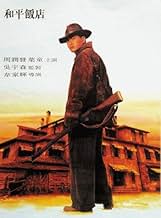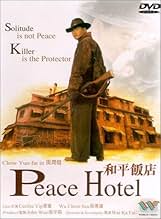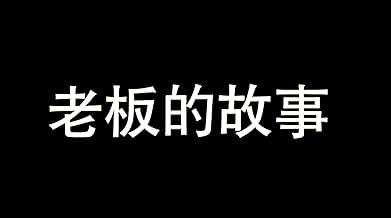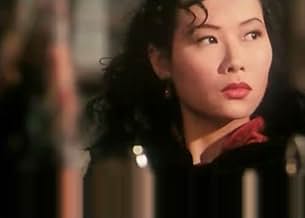Wo ping fan dim
- 1995
- 1h 29min
Aggiungi una trama nella tua linguaA retired old west killer sets up a hotel for vagrants and wayward souls called Peace Hotel. When a woman with a gang on her tail attempts to hide there the owner of the hotel must revert to... Leggi tuttoA retired old west killer sets up a hotel for vagrants and wayward souls called Peace Hotel. When a woman with a gang on her tail attempts to hide there the owner of the hotel must revert to his old ways to protect his hotel.A retired old west killer sets up a hotel for vagrants and wayward souls called Peace Hotel. When a woman with a gang on her tail attempts to hide there the owner of the hotel must revert to his old ways to protect his hotel.
- Regia
- Sceneggiatura
- Star
- Premi
- 1 vittoria e 6 candidature totali
- The Killer
- (as Chow Yun Fat)
- A Bandit
- (as Kwok-Ping Choi)
Recensioni in evidenza
Known as "The Killer" yet again, Chow commits mass murder in a blind rage, and then vanishes from the murder scene to build the "Peace Hotel," a supposedly sacred place for crooks and degenerates to run to if they're on the run from the law or any criminal element, and have nowhere else to go.
That all changes when a woman played by Cecilia Yip arrives claiming to be Chow's long-lost wife. I tell you, I've never heard more lies spewed forth from a movie character in such a short amount of time until I saw this movie. It's just lie after lie with this one, and she's persistent, too. Chow never falls for these sob stories of hers, and quickly debunks them as the myths they are, usually following up with a smack upside the head with a paper fan or a broom or something.
Then a gang arrives, apparently after her for killing one of their bosses, but Chow's code won't allow her to be killed by them. No matter. It's obvious and inevitable that he'll take up the sword once again.
As a comedy-drama, Peace Hotel works in a few ways, but not many. It makes for an unconvincing romance story. And as an action story, it's abysmal. The swordfights are some of the worst-edited sequences I've ever seen. Imagine Paul Greengrass filming a man swinging a flaming torch (and later, a sword) through countless bad guys. Now imagine Olivier Megaton, fresh from Taken 3, editing that footage. Now imagine that footage sped up. Yeah. It's bad.
The single shootout sequence, however, is fantastic, and a major contrast to the editing style applied to the swordfights. I suspect John Woo, who helped produce this film, took over the director's chair for this sequence, because I can't see how the same director who did such poor swordfight sequences could have done such a grand shootout like the one on display here. It's the only plausible explanation.
Overall, the acting is corny and not all that great, although Chow seems to really give it his all and seems to be the only one really trying to churn out a decent performance. The comedy works, sometimes, but often falls flat. The plot twists are silly. The music is distractingly poor sometimes. I think the second half, with the exception of the shootout, is where things really started to fall apart. Unfortunate, because this could have been better had it been handled with more care.
Chow Yun Fat plays the Killer, a gang leader with a tragic past. During a fight with a gang, his wife is killed. The Killer goes nuts and kills everyone including his own gang. Years later he opens the "Peace Hotel", a place for criminals on the run to find refuge and reform. In enters a woman claiming to be his dead wife. The residents of the Hotel are fooled but of course the Killer isn't and is very angry at her deception. His anger is compounded when she steals his belongings. He is about to throw her out when a huge gang shows up on horseback. They are after her for killing their beloved leader. The Killer changes his mind and shelters the woman. Despite his kindness, the woman continues her deceptive ways. The gang demands that the woman be delivered to them in 21 days or else they are going to storm the hotel.
A very well made production, the sets are great, the acting overall very good and Ka-Fai Wai's direction is very assured for a first time effort. There is a good sense of humor throughout. Chow Yun Fat is great and carries the film from start to finish. The music is good, very reminiscent of Morricone or the great chambara themes although the obvious use of synthesizers for all the instruments lowers the quality a little. The biggest problem for me was a couple of very big plot holes (at least that's how I saw it) which is sad since the film is very good. The action is not central to the movie and those looking for elaborate martial arts will likely be disappointed. The big action scenes are shot in blurry close-ups with lots of dust and shaky camera work. Celia Yip's character gets beaten and slapped around a lot in this film (the character repeatedly provokes most of the abuse) so you might think twice before watching this with a girlfriend.
A good film for Chow Yun Fat fans and anyone looking for unique examples of HK film making.
There are very good performances in this film. Chow Yun-Fat does an excellent job as "The Killer." Cecilia Yip is a very strong and bold female character. As the relationship of the two develop, I actually sympathised and liked the two characters.
The action scenes are well done, for the most part. The machine gun attack and the final sword fight were very well done. The other sword fights were somewhat blurry. Ching Siu-Tung should have been on hand to choreograph those scenes.
I also thought that the end was very powerful and emotional. It even rivals the ending of The Killer. In the end, this movie is worth seeing not only for its action sequences, but for the great performances by the two leads. This movie is not as good as his Woo films, but it is still a powerful movie.
A western with artistic stylizations, the film is off-beat and somewhat entertaining; if not terribly original or well-written. The majority of the characters are caricatures, the dialogue is farcical and to call the story predictable would be an understatement. The central conceit is an interesting one, but it is not exploited in a manner that is either subtle or particularly effective. However, one does get quite wrapped up in 'Peace Hotel' anyway, as one would with a cowboy B-movie from the 50's. There are plenty of twists in the tale, a dash of romance and much humor; a concoction that makes for an enjoyable- if underwhelming- viewing experience.
It must be said that the production design overseen by Wai Ming Yau and Chung-Man Yee is impressive and atmospheric work. The sets look weathered, with the titular hotel being particularly striking. The costume design is also worthy of note, not to mention Wing-Hang Wong's cinematography. It is highly stylized and distinct, at times almost dreamlike. Admittedly though, the hurried camera movement occasionally makes for sequences that are overly hectic, particularly the fight scenes; which are quite hard to follow.
That may be more of an issue resulting from Kuo-Chung Chou's editing, though; which is loose and untidy. Many scenes feel disjointed and the narrative is made unnecessarily abstruse, with the impact of the overall film being somewhat lessened. As mentioned above, the fight scenes are especially bewildering, looking like they were shot on 8mm and edited by a blind man for an amateur music video from the early nineties. The pacing is also problematic, with the beginning being quite slow and the latter half of the film feeling quite rushed. Under Wai Ka-Fai's direction, Chou's work leaves an impression on the viewer alright- and not a positive one.
The cast do much more memorable work, Chow Yun-Fat and Cecilia Yip in particular. Chow is a very charismatic performer, with a magnetic screen presence, and his performance as Wong A-Ping is reserved and steady. The character may be underwritten, but he makes him a likable fellow of some depth all the same. Credit for the film's story also goes to Chow, so aside from a good performance he came up with an intriguing concept to boot.
Yip plays Shau Siu-man, a self-centered rogue you cant help but like; perhaps because of the joy of her performance. She doesn't take the role too seriously, there's a tongue-in-cheek element to her chicanery that is most attractive, and she and Chow have a natural chemistry that makes watching them together a treat. Of note from the supporting cast are Shun Lau as a blind resident of the hotel and Jacklyn Wu, who appears in flashback as Chow's wife.
In short, 'Peace Hotel' doesn't make for fantastic cinema, but it does hold entertainment value. The visuals are strong, as are the performances from the cast. The unremarkable story and its oftentimes laughably banal dialogue is problematic though- as is the terrible editing- dooming the film to the realm of mediocrity. John Lennon once sang 'Give Peace A Chance,' but if it's 'Peace Hotel;' perhaps it isn't worth it.
The music by Healthy Poon and Cacine Wong is effective and in a similar vein to the Ennio Morricone score in the spaghetti westerns and the theme song by Alex San (music),Erica Lee (lyricist)and Cass Pang Ling (performer) fully deserved its win at the 1996 Hong Kong Film awards.
Those watching this film expecting highly choreographed gun-play sequences due to the presence of John Woo as executive producer will be disappointed as the action is infrequent and is filmed in a confusing style that probably better represents the confusion of a real fight. Peace Hotel is more character-driven than action orientated anyway and is all the better for it. Written by Chow Yun-Fat and Wai Ka-Fai (who is probably best known for co-directing 'Fulltime Killer' (2001)) there is some great dialogue and more character development than is usual for a film in the genre.
Peace Hotel may not be as good as some of Chow Yun-Fat's earlier work with John Woo, but it makes an attempt to be different and deserves credit for that.
Lo sapevi?
- QuizChow Yun Fat's last Golden Princess movie.
- Citazioni
The Killer: Put your trousers back on, before your willy catches a chill
- Versioni alternativeVideo version includes 2 minute sequence with The Killer using machine gun to kill bandits that is not in theatrical version.
- ConnessioniReferences Django (1966)
I più visti
- How long is Peace Hotel?Powered by Alexa
Dettagli
Contribuisci a questa pagina
































